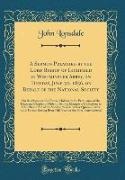Read more
Excerpt from A Sermon Preached by the Lord Bishop of Lichfield in Westminster Abbey, on Tuesday, June 3d, 1856, on Behalf of the National Society: On the Occasion of a Festival Holden by the Permission of the Dean and Chapter in Order to Set the Example of Collections in Churches in Aid of the Society, the Customary Queen's Letter in Its Favour Having Been This Year for the First Time Refused
In this we have undoubtedly the mind of a devout believer; and there is much in it to which both heart and judgment may consent. Yet does it not too much appear, in some respects, to indicate a hope of something more like new revelations, than only fresh and lawful applications of the old - and, still more certainly, to open into possible results, such as would surely make the fancy of some, and the fanatical zeal of others, the judges and expositors of Scripture doctrine?
None of these passages, however, are quoted with the slightest view of controversy but, as before said, simply for purposes of illustration. If they may serve that turn, it is enough. The reader who may wish to watch more daring ¿ights, may find some in an article on Pantheistic Tendencies, in the last num ber (lii.) of the Christian Remembrancer. Those who agree with the present writer in fearing that there is more or less of error and danger in all, will probably agree also, that their worst danger lies in that confusion and intermixture of truth which is traceable in all; and their error, in too much substitution of intellectual and theoretical, for simply dutiful and practical views of our abiding Revelation.
About the Publisher
Forgotten Books publishes hundreds of thousands of rare and classic books. Find more at www.forgottenbooks.com
This book is a reproduction of an important historical work. Forgotten Books uses state-of-the-art technology to digitally reconstruct the work, preserving the original format whilst repairing imperfections present in the aged copy. In rare cases, an imperfection in the original, such as a blemish or missing page, may be replicated in our edition. We do, however, repair the vast majority of imperfections successfully; any imperfections that remain are intentionally left to preserve the state of such historical works.

